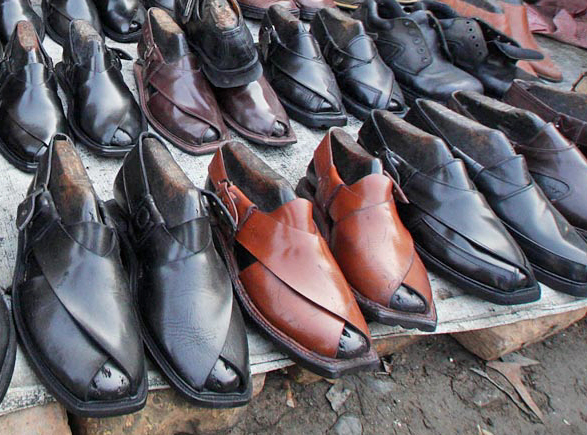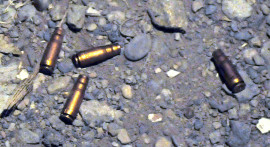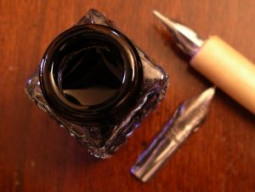
At least one Karachi-based company is in talks with a lawyer to see if Smith could be sued for using the sandals’ name and design, which originate from Khyber-Pakhtunkhwa.
“Somebody has to take an initiative,” said Omar Farooq, the CEO of Chase Value Centre, a small-scale retailer. Farooq’s extended family manages the much bigger business of Chase Up.
“At the moment, I am not sure if we can actually sue Smith but we will meet our lawyer in a day or two to see if there is a possibility.”
Smith, the menswear designer, has put up the Black High Shine Leather Sandals up for sale on his website for £300 or Rs49,500.
There is hardly any difference between the average Peshawari Chappal made at hundreds of small workshops across the country and Smith’s product except for the ‘neon pink trims’ added to the British version.
Description on the designer’s website mentions it has been inspired by Peshawari Chappal.
However, local fashion designers and commentators unleashed a barrage of criticism against the designer for not attributing the sandal with Pakistan when he first marketed it. Reportedly, Smith had named the sandal Robert before the website was updated.
Chase’s Farooq is hoping to draw attention towards what he sees as a violation of the country’s rights.
“I’m not a lawyer but if Smith decides to get a patent and we prove that we’ve been selling the same thing for years then he has some explanation to do.”
Like most others, Chase sells a 100% leather-made pair of Peshawari sandals for Rs995, literally making it impossible for the high-end English brand to make any significant inroads in the local market.
The story surrounding the sandals is reminiscent of what Pakistan’s Basmati rice exporters have faced in recent years.
Basmati, the good quality long-grain rice, grown specifically in Pakistan’s Punjab province, has literally been labelled as an Indian brand internationally.
Yawar Irfan Khan, senior partner of Lahore-based United Trademark and Patent Services, says the case of Peshawari Chappal, just like rice, revolves around the geographical indication (GI) – the place from where the product originates.
“This sort of an issue should be taken up by the Intellectual Property Organisation of Pakistan,” he said. “It is just like scotch whisky. You can put whatever brand name you want on it but its Scottish origin doesn’t change.”
Governments vigorously pursue GIs to add value to their products, he said. “Here, I would also blame our own entrepreneurs who pay little attention to copyrights and patents.”
According to IPO Pakistan’s Controller of Patents Sabir Gul Khattak, no one has applied for the copyright of Peshawari sandals yet.
“That designer must have registered the sandals in England so he can sell it. I don’t think we can do anything about that,” he said. “The main issue is that our people don’t register brands and products and then create a fuss when something happens.”
But Khattak said that GI could be used by the government to claim its people have the right to make and sell Peshawari sandals. It remains unclear if Paul Smith has sourced his supplies from Pakistan.
Islamabad’s track record in defending its products is poor and there are fears that attempts to sue or drag Smith in a legal battle would be futile without active official support.
However, Chase’s Farooq believes in sending a message across.
Published in The Express Tribune, March 12th, 2014.
Like Business on Facebook, follow @TribuneBiz on Twitter to stay informed and join in the conversation.
COMMENTS (22)
Comments are moderated and generally will be posted if they are on-topic and not abusive.
For more information, please see our Comments FAQ


1725612926-0/Tribune-Pic-(8)1725612926-0-165x106.webp)














I think Mr Farooq has done the right thing. Mr Farooq thru his lawyers may ask the court for a judgement by which Mr Smith has to add a label on each stating "Inspired by the design of Peshawari Chappal!!!"
What a load of commentating codswallop! Basically there are two designs of Pushtoon chappals in Pakistan, the 'Peshawari' and the 'Quetta'. The Quetta style being heavier and more robust. At a guess I would suggest the 'Quetta' style has it origins in Kandahar, and the 'peshawari' from Peshawar and Kabul. If the Pakistanis get upset with Paul Smith, then the Afghans should get angrier still. After all I imagine Pushtoon chappals are traditionally worn by a majority of the population of Afghanistan as opposed to only a minority of the population (the Pushroon and the Baloch) of Pakistan. It just goes to show are immature some of our commentators can be. For the I can only say is grow up!
Pls take a trip down Zainab market its full of Paul smith polo copy shirts. So is he gonna sue us actually yes he can for making copies???
Are you trying to tell me we in Pakistan do not make or copy designers from the west.It is done all the time ??? So do they sue us for wearing counterfeit products or copies?????
@ Cheema
Next you will claim that all the prophets were born in Punjab and everything under the sun originated in Punjab.
By the way Punjabis wore loin cloths not Shalwar Kameez. Maula Jat did not wear Shalwar kameez, which came from Afghanistan/Persia.
its funny. DR.SCHOLLS copied the Peshawari chappal design YEARS ago. In fact I saw people in Pakistan wearing it. Nobody said a word then!
You can not sue for design which is not copy righted since it's inception, you can only sue them or convince them to sue the name "Peshawari Chappal" .
Complete rubbish of an article, with no understanding of patent laws. No, you cannot sue this designer. No, he has done nothing wrong in getting his inspiration from another country/culture, and has no obligation to state the source of inspiration.
Simply, it is not a patentable product. (Neither are T-Shirts, Polo Shirts, or Moccasins!). Nothing but sour grapes from a nation with nothing going for it.
@ Cheema: They DO hail from Peshawar, hence, the name. The 'Khairis' that you speak of are something else entirely!
A friend of mine used to work in PAKISTAN RICE EXPORT CORPORATION in early 70's. I came to know thru him that at that time Pakistan's rice export policy was that one could only export rice either in 1 or 2 kilo cardboard boxes (too expensive and also not feasable to the consumer) or in bulk in containers only. Indian traders imported Pakistani high quality basmati rice in containers to Dubai free port, bagged them in 10 or 20 kilo bags (bags made in India and labelled as Rice from India) and exported all over the world as Indian rice. Now my question is what influenced the Pakistan export policy for the Indian traders to take advantage of, where as the Pakistani exporter was barred doing the same? Answer: as usual Pakistani filth, and blamed on the rest of the world (so your own culprits can get away with their crimes, Still the same happening in all walks of your life).
If sued it would get fame without any good advertisement, smith's design would be sold more than your Peshawari chappal. So keep calm, and force your govt to provide export opportunity to other coutries for your chappal which would help the local community. (Posting comment sitting in office wearing Charsadda's special Chappal :).
@Cheema: For you kind information Pashto first book was written 2000 years ago.
@Ch. Allah Daad: Jealousy is disease that has no cure.
The outrage of a foreign design company sounds like sour grapes. Let's get real local companies could have market the shoes but corruption laziness are trends that are more a part of our community!
Lacoste doesn't have patent on Polo Shirts per se. it just has rights to its cut stitch quality and logo:) polo shirts been around longer than Lacoste has. and on the subject of Chappals, maybe a pair should be sent to Paul "Robert" Smith from Peshawar Museum:)
The Peshawari chapals were never patented, giving anyone the right to come up with their own version and sell it as whatever they like. If Pakistani businessmen are considering suing Paul Smith for this, maybe Lacoste should sue anyone and everyone who manufactures polo shirts...
Goverment particularly the much celebrated KPT ruling party should be pro-active on this. It is worth an atempt
One designer makes one product inspired by something Pakistani and he is met with outrage and potential lawsuits from someone who has nothing to do with these sandals. Before a white designer made it 'cool', how many of these people actually even wore it?
Unfortunately no one can do anything about Peshawari Chappal's design but there is still one more product which should be patented immediately. That product is "Naswaar".
Absolutely they need to be sued, its not a matter of money rather its a matter of pride